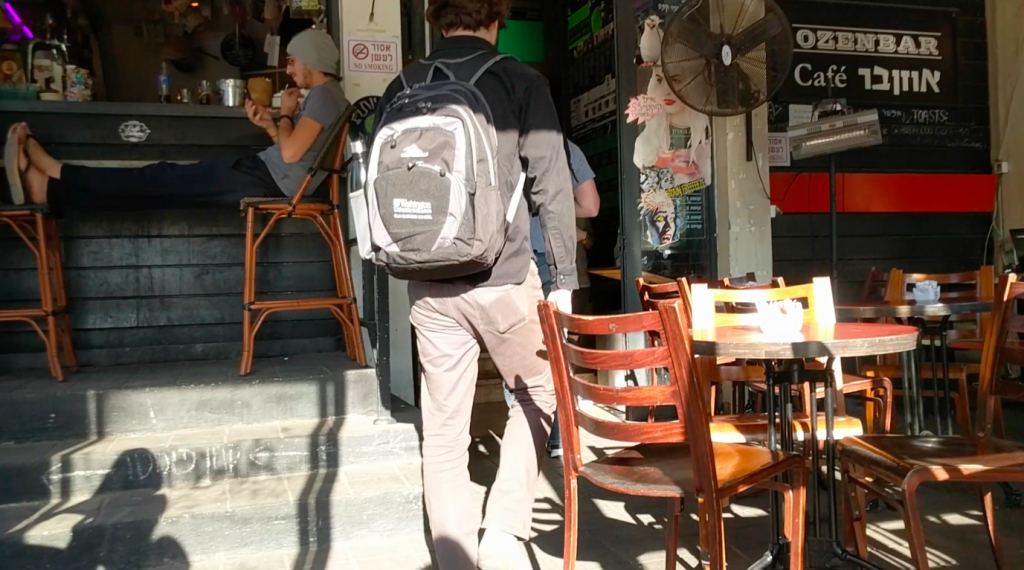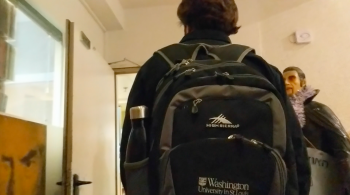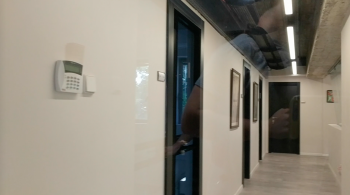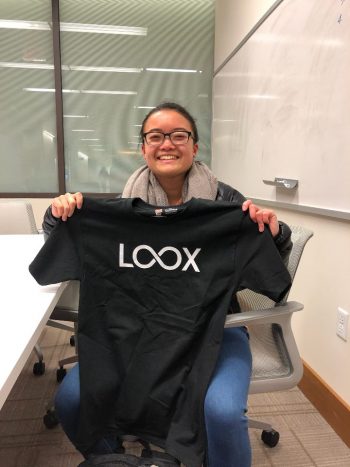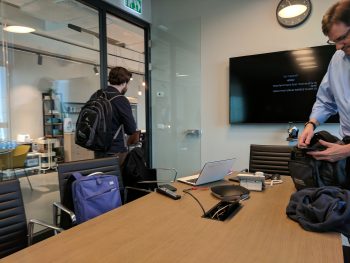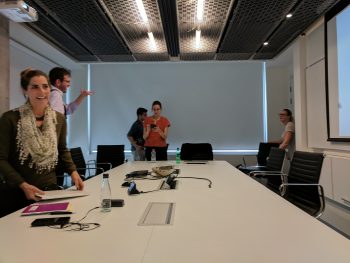It was a Platform Nine and Three-Quarters situation. We were at the correct street address for the client’s office, but nothing around us looked like an office. In front of us was a cafe, and across the street was a line of shops, ranging from a yogurt store to a deli to a currency exchange stop. The Dizengoff Center area was busy as always, people and cars making their way home near the end of a workday.
We were here to meet the founder of the startup that we would be consulting for, as long as we could find this elusive meeting spot. We paced back and forth along the street, as if hoping that it would suddenly appear. Eventually, we decided to walk inside the cafe and investigate. A staircase in the back seemed promising, so we walked up one flight.
We arrived at a music store. Another flight led to a bar, empty at this time, except for a few employees prepping the space for the evening. One more flight brought us to a strange, lifesize statue of Dracula, guarding a used bookstore. We kept climbing to the final level–a coworking space with offices, meeting rooms, and a modern, aesthetically-pleasing kitchen area.
Our client was called Loox, a company founded by a graduate of the Interdisciplinary Center Herzliya’s prestigious Zell Entrepreneurship Program. This meeting was the first time we would be speaking with the client, the objective being to gain an understanding of their company history, ask questions about their business model, and begin defining the scope of our project for the semester.
Loox is just two years old and run by only three individuals, but its revenue would indicate otherwise. To explain the company in as few words as possible: they have made a Shopify reviews app. Specifically, the app helps online retail businesses by reaching out to previous customers and asking for photo and text reviews of purchased products. These reviews are published on product pages, in turn increasing the likelihood of future shoppers to buy the products. Our consulting project’s goal is to identify, assess, and recommend additional revenue streams for Loox, to supplement the monthly $9.99 subscription fee.
One of my goals for this trip was to witness Israel’s startup culture firsthand, and considering it was just a five-day program, I was able to gain a lot of insight. The program kicked off with an introduction to this “startup nation” and reasons why it’s so entrepreneurial. We talked about factors such as the mandatory military service, the fact that it’s a small country (only slightly larger than New Jersey), and the significant amounts of venture capital money flowing in. The main point that I took away, though, is the mindset that people have. Of course, this mindset is a generalization, but Israelis tend to challenge the status quo and are not afraid to fail. In addition, I’ve noticed that they are direct in speaking their mind, value efficiency, and take action. Furthermore, many people have a short-term mentality because the country’s state of affairs could change at any given moment; this mentality can be translated as adaptability. All of these factors are positive attributes when it comes to cultivating innovation.
This mindset was evident in our Israeli program leader, Liraz, also a Zell graduate. If the fact that she rode a motorcycle to meetings wasn’t reason enough to respect her, I also found her mentorship to be especially valuable during our two feedback sessions with the entire group. During these short presentations, each group gave an update on their progress with the project, as well as plans moving forward. Liraz wasn’t afraid to be critical, and I was impressed by her razor-sharp evaluation of every part of the presentations. At the same time that she was an effective professional, she was also a convivial presence.
I’m writing this blog post back on WashU’s campus, specifically in my favorite corner seat of Cafe Bergson, sipping a hot soy latte because I’m no longer in the warm land of Israel. Not long ago, I was enjoying my last day in Tel Aviv, sitting at the beach, watching the sunset over the Mediterranean. While I had only been in Israel for 10 days, I confidently navigated Tel Aviv like a local (everyone knew I was a tourist), taking minimal peeks at Google Maps to make sure I wasn’t going in the completely wrong direction. Those 10 days were full of shawarma (average consumption = 1 per day), dividing by four in my head (rough conversion from Israeli Shekels to USD), and learning random Hebrew phrases (phrase most used by the team: “ma nishma?” which means “what’s up?”).
Our team is continuing to work on this consulting project here in St. Louis, which will culminate in a final presentation and written report. We’re starting with a two-week research phase, during which we’re gathering information from subject matter experts. Come March, we plan to have a solid recommendation for Loox, backed up with quantitative analysis.
It’s actually my last semester at WashU (graduating in May!), and this project will be a capstone of sorts since my major doesn’t require a thesis. This Venture Consulting class complements the rest of my schedule, which includes Business & Marketing Innovation, Internet of Things, and Creative Nonfiction Writing 1. The project is an opportunity to put to practice and demonstrate the skills I’ve learned these past four years at WashU. And I’ll definitely return to Israel someday.
